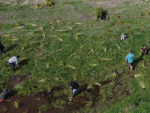Ministry for Primary Industries (MPI) inspectors are on the ground in Otago and Southland to support animal welfare as farmers enter the winter grazing season.
"MPI inspectors are conducting proactive visits to Otago and Southland properties to check farmers have good plans in place to manage the welfare of their livestock on crops," says MPI's director compliance services Gary Orr.
The visits will initially focus on 50 farms identified as being potentially at risk. "We'll use these first visits to check in with farmers to make sure they've made the necessary preparations. It will include taking farmers through a practical check list developed with industry and councils to help improve animal welfare outcomes.
"A well-planned winter grazing system supports good animal health and welfare. It ensures animals have sufficient and appropriate feed, access to clean water, and comfortable areas to lie down and rest.
"Some farmers will need to continue adapting their systems to ensure they have more robust back-up plans during extreme weather."
Follow-up visits will be conducted in June.
For the follow-up visits, MPI will prioritise those farms which were identified as high-risk in their first phase of visits, as well as any property where they have received complaint.
"Most farmer work hard to do the right thing and have carefully planned ahead to look after the animals," says Orr.
"Where we find evidence that an animal is suffering or is likely to suffer, we will take action. The welfare of the animal will always be our priority, so we look for practical actions to correct the issue.
"At the low end of the scale it could be the issue of a directive to move stock or provide access to stand off areas away from the feeding areas. For more serious issues we might bring in vets to make an independent assessment, require the farmer to bring in extra feed, and in the most serious cases taking a prosecution."


















